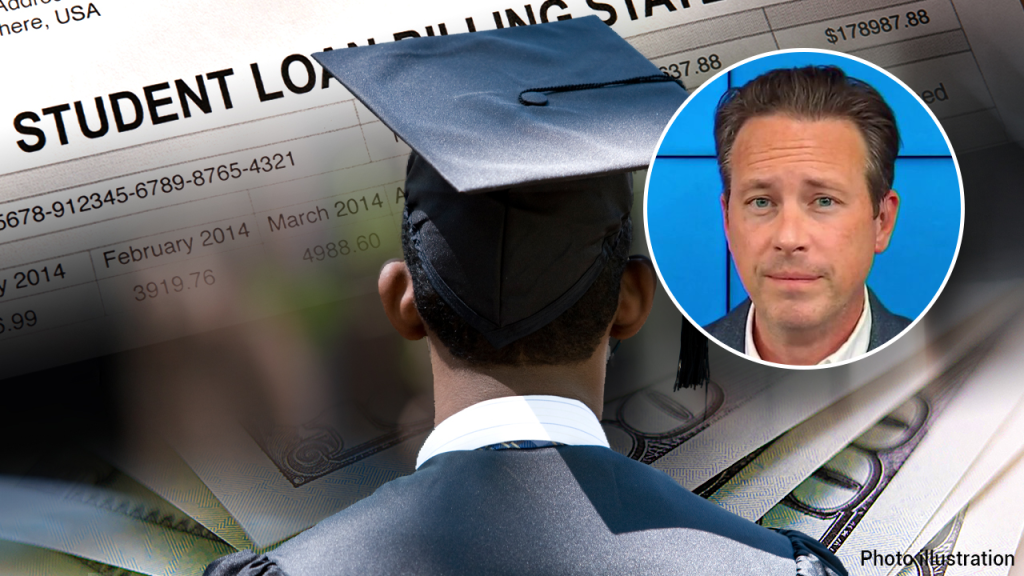As borrowers prepare for student loan payments to resume, one personal finance expert is calling out the “marketing lie” of higher education and offering advice for those facing the extra bill.
“I’m very concerned about the people who thought that Uncle Joe was going to come through and get rid of their student loan debt,” “The Ken Coleman Show” host Ken Coleman said on “Cavuto: Coast to Coast” Tuesday.
The Ramsey Solutions personality added he fears only a “small percentage” of borrowers used the period of interest pause to save for the hefty bill.
OVER 4 MILLION STUDENT BORROWERS ENROLL IN BIDEN’S SAVE FORGIVENESS PLAN
“I have no data to back that up, except that the human behavior during all of this skyrocketing wage increases that we’ve seen over the last several years, credit card debt still continues to set new records,” he said.
“That is just really heartbreaking,” he added.
For more than three years, federal student loan borrowers have not had to make monthly payments.
But that pandemic-era pause has officially come to an end, setting up a potential financial shock for millions of Americans.
MIKE ROWE CELEBRATES MORE STUDENTS FORGOING COLLEGE FOR APPRENTICESHIPS: ‘CHICKENS HAVE COME HOME TO ROOST’
About 44 million borrowers in the U.S. were affected by the payment pause, which initially began in March 2020 at the onset of the COVID-19 pandemic. The Biden administration extended the pause for the eighth time last November but will not do so again as part of the bipartisan debt ceiling deal approved by Congress.
“We took their calls on ‘The Ramsey Show,’ on ‘The Ken Coleman Show,’ and people say, what do we do? What do we do? And we said, ‘Pay it off. The government is not going to get rid of your debt,’” Coleman said.
With payments resuming in October, the most recent Federal Reserve data projects the average monthly bill hovers between $200 and $299 per person, although it is even higher for some borrowers.
Interest will start accruing at the start of September.
Coleman said it is time to “start calling out Congress and the White House” to actually address the source of the problem – “skyrocketing” tuition.
MIKE ROWE RIPS ‘EXPONENTIALLY EXPENSIVE’ COLLEGE COSTS: ‘IT’S BANANAS’
“The answer is the unbelievable skyrocketing tuition. It’s big business for these state governments and their economies to have colleges and universities funded by these federal student loans. And the American people are the ones that are hurting. They’re taking too much debt out and it’s ruining their lives – literally… No one’s talking about it in Congress.”
With the rising cost of tuition comes a greater need for loans for many students. However, many students are learning the hard way that a college degree is not always the best path.
“The message has been since the ’70s, get a college degree, and you’re going to have a better life,” Coleman said.
“But here’s the reality,” he added. “That’s not the truth anymore.”
Between 1980 and 2020, the cost of college and university programs have surged 169%, according to a report from Georgetown University’s Center on Education and the Workforce.
Nationally, however, there has been a surge in trade school attendance and other college alternatives as more people find the cost of a degree not to be worth the money.
“With trade schools exploding, new trades like technology schools, coding boot camps, as an example, exploding, We see more and more in the headlines every day that corporations are having to retrain college grads to actually do the work that they need them to do,” Coleman said.
DEMAND FOR SKILLED WORKERS ON THE RISE
Over the past decade, college enrollment has declined about 15%, while the number of apprentices has increased by more than 50%, the Wall Street Journal reported based on federal and Urban Institute data. Estimates today show that colleges and universities enroll about 15 million students in total, while companies employ around 800,000 apprentices.
“There’s a marketing lie that says a college degree is the only way to success, and that’s not true.”
A recent study from the Higher Education Advisory Group (HEA Group) found that some of the most popular college bachelor’s degrees don’t always lead to high-paying jobs and the author of the study is challenging prospective college students to make an informed decision about their career choices.
The study found that the top 10 most popular bachelor’s degree programs don’t necessarily lead to the highest salaries.
While data found that the graduates earned more than $40,000 annually, only business administration, registered nursing and accounting showed graduates earnings above $50,000 per year. The lowest-paying major of the group was teacher education and professional development with majors like psychology, liberal arts, communications, criminal justice, biology and health and physical education falling into the average.
“I see a splintering of education in the future because it can’t keep going the way it is,” Coleman claimed.
“There’s a marketing lie that says a college degree is the only way to success, and that’s not true. Two questions young people and parents need to be asking. Is a degree the only way or the best way to get the future that I want? And if the answer is no, I got good news. Less expensive and less time-consuming alternatives are everywhere.”
FOX Business’ Megan Henney, Sarah Rumpf-Whitten Kristen Altus contributed to this report.
Read the full article here














